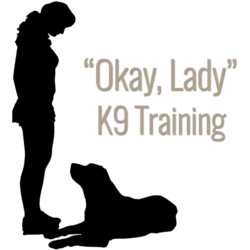The idea of correcting before the crime is really just a matter of communicating with your dog while you still can. Dog’s spend most of their lives on a hair-trigger that, when pulled, creates extreme levels of arousal and excitement. Once that trigger has been pulled, it is very difficult for your dog to hear anything outside of its head. Once the trigger has been pulled any correction can actually just add to the intensity of the agitation that your dog is already feeling.
A Practical Purpose for Place – Building Confidence
Another purpose for the place command is for helping you dogs gain confidence about things that they may fear. Kaiba is working through his fear of the vacuum cleaner.
A Practical Purpose for Place – Family Meal Time
As a family, we still enjoy sitting down together for dinner. My husband and I have coffee together (and sometimes even lunch) at the dinner table. It’s times like these that I want to just enjoy visiting with others and don’t want to be interrupted with dog shenanigans. For this reason, the dogs “place.”
Taking it One Step Further
There are some dogs that we must require a little more self-discipline from. These bratty, stubborn, or over-stimulated dogs need to be corrected while they are still able to hear you – while communication is still possible. Know the warning signs your dog gives, and be prepared to guide them into the right frame of mind.
Punishing before the Crime
Most dogs live their lives in some state of arousal. The problem with arousal is that even if it is at a very low level, it doesn’t take much to blow into severe cases. This is why it needs to be squashed at the first sign. If correction doesn’t happen until the arousal is already escalating, it is only going to be good for creating a blow up much more quickly. By punishing the intent of your dog, you can stop the crime before it even has a chance to get past the tip of your dog’s brain.
Training without Emotions
Sometimes we so deparately want our dogs to succeed that we don’t give them the chance to make the right move or we become frustrated or demanding. This causes stress and confusion in our dogs, which impairs their ability to give us their best. If we can keep our emotions out of training, our dogs will be much more likely to succeed.
Training Tool #8 – The Pet Convincer
This tool squashes excitement and arousal in a hurry, and works for dogs of all sizes. You can even buy replacement air cartridges!
One-Size-Fits-All Dog Training
There is no such thing as a one-size-fits-all dog training program. Do what works with your dog.
“No” vs Other Words and Sounds
No is one of those words that must always have a follow through action. If you are unwilling or unable to back up your “no,” then it’s a good idea to use another word.
Training Tools Don’t Train
The tools are great mode of communication, but what are you trying to communicate to your dog? You are the wizard behind the curtain.

